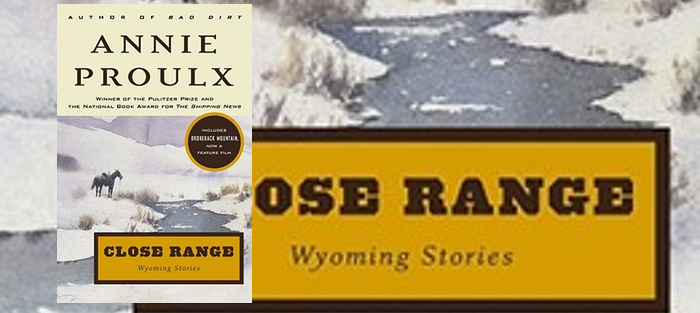I’m a bit embarrassed to tell you that I love Annie Proulx’s “55 Miles to the Gas Pump” (Close Range: Wyoming Stories, 1999). Embarrassed because the content of the story—a rancher who murders women for pleasure and commits suicide by throwing himself from a canyon cliff; the wife who saws her way into the rancher’s padlocked attic, where she finds the women’s corpses (“all of them used hard”)—is macabre, gory, and revolting.
And I suppose if the story was unremittingly macabre, gory, and revolting, I would be uninterested. But it’s not.
First of all, “55 Miles to the Gas Pump” is extremely short, a grim 266 words confined to two slim paragraphs and a final sentence that hovers at the bottom like a punch to the gut—or a punch line. Each paragraph is a sentence: the first two are long and breathless, convoluted, and littered with gerunds; the last is straightforward and deadpan. Yet this form of story—brief and syntactically odd—provides a necessary counterbalance to the subject matter. For the brevity and almost-metered syntax corsets the disturbing content into something manageable. Like the way the strict structure of a sonnet contains and organizes the emotions explored within it. Or, like one of those fake-cherry chocolates that you accidentally pick from the box: horrible, but, three quick bites and a swallow later, you’re done.
I can also stomach “55 Miles to the Gas Pump” because it’s funny. Not laugh out loud funny, exactly—and perhaps only funny if you’re the sort who appreciates gallows humor—but funny nonetheless. The first paragraph of the story is devoted to “that walleyed cattleman” Rancher Croom. We learn that he makes his own beer (“yeasty, cloudy, bursting out in garlands of foam”), that he’s a “quick-foot dancer,” and that one drunk night he ends his life. The second paragraph concerns Mrs. Croom. We see her on the roof, peering down to a roomful of bodies that she recognizes from the newspaper.
None of this is comical, not even remotely so. But here’s the last line, which, to me, reverses everything that came before it: “When you live a long way out you make your own fun.”
That’s the moral of the story? That’s the takeaway? It’s so utterly different from what one would expect that I can’t help, each time I read the story, to let out a long half-laugh, half-sigh. For me, the distance between what I imagined the last line of the story to be (something serious and wise) and what the last line actually is (shocking, ridiculous, and amusing) creates a dark, bleak humor.
Further, that final line subverts what the story is about. As the title suggests, “55 Miles to the Gas Pump,” while somewhat interested in the abuse and murder of women and the troubled marriage of Rancher Croom and Mrs. Croom, isn’t exactly about those things. For it’s also about another type of distance: geographic. That is, what the absence of civilization and human contact can do to unstable, lonely minds.






